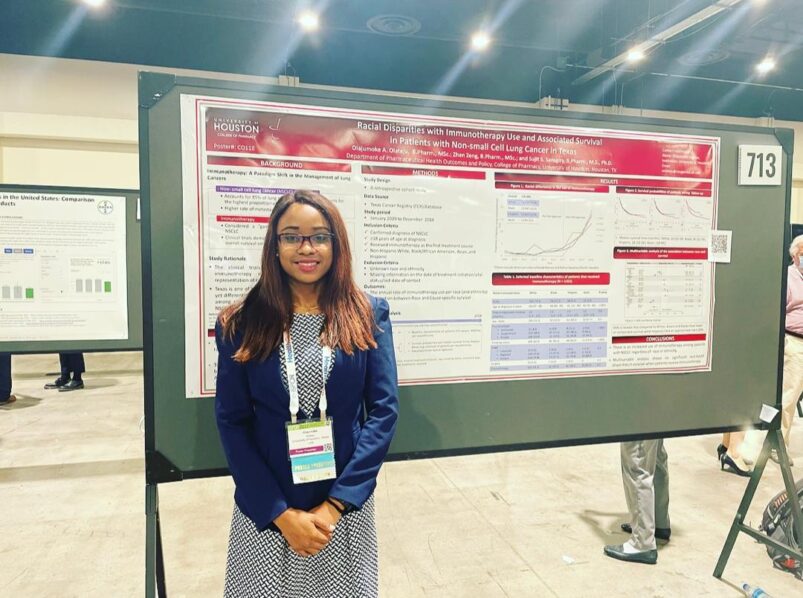
In the heart of the University of Houston College of Pharmacy, Olajumoke Olateju is making waves in the field of health outcomes and policy, drawing inspiration from the renowned Nigerian trailblazer, the late Professor Dora Akunyili. Olateju’s journey exemplifies the growing trend of Nigerian scholars using their academic excellence to benefit America while honoring their roots.
Olateju’s inspiration comes from the impactful legacy of Akunyili, who spearheaded groundbreaking reforms in Nigeria’s pharmaceutical sector. The erudite scholar served as the Director-General of the National Agency for Food and Drug Administration and Control (NAFDAC) from 2001 to 2008. During her tenure, she waged a tireless campaign against counterfeit medicines, saving countless lives and setting a new standard for pharmaceutical integrity. Like anyone fighting against the system, the globally acclaimed pharmacist’s work was not without challenges. She faced constant death threats and even survived an assassination attempt in 2003. Despite these obstacles, her efforts led to increased public awareness about counterfeit drugs and more effective surveillance at Nigerian customs.
Like Akunyili, Olateju sees pharmacy as a profession and a powerful tool for social change. Her research at the University of Houston is pivotal, examining cancer immunotherapy and its differential impacts among patient populations. As she delves into the complexities associated with immune checkpoint inhibitors for lung cancer and melanoma, she uses this tool to identify which patients are most likely to benefit from this innovative treatment.
Olateju, BPharm, MSc, a budding researcher in health economics and outcomes research, is making significant strides in utilising big data to evaluate health outcomes and shape policy. With over a decade of professional and research experience in the pharmaceutical and healthcare industries, Olajumoke has established herself as an emerging scholar in pharmaceutical health outcomes and health data research. Olajumoke achieved First Class Honors from the Faculty of Pharmacy at the University of Ibadan, followed by a master’s degree in Pharmaceutical Analysis from the same institution, also graduating with first-class honors. Her work with Catholic Relief Services (CRS) on the Global Fund Malaria Grant sparked her passion for population health outcomes. Beyond supporting health program implementations through supply chain management, she has acquired skills that can enhance evidence-based approaches to identify and address gaps in healthcare systems.
Her achievements have not gone unnoticed. At the American Pharmacists Association’s 2023 Annual Meeting in Phoenix, Arizona, Olateju’s research on the trends and barriers to first-line treatment with immune checkpoint inhibitors earned her the prestigious Best Podium Presentation Award. This accolade is not just a personal triumph but also a testament to the potential and talent that many Nigerians possess. As we all say in Nigeria, “who no like beta thing,” but we must remember, say this beta thing dey make our health system dey suffer as the best brains keep leaving Nigeria with plans never to return. However, Olateju’s story also highlights a broader, more complex issue: the phenomenon of brain drain. This mass exodus of skilled professionals from Nigeria to more developed countries is a significant challenge. As talented individuals like Olateju excel abroad, Nigeria continues to suffer from a shortage of skilled professionals, particularly in the healthcare sector. The Nigerian health system, already strained, struggles to cope with the loss of its best and brightest minds. While America reaps the benefits of talented individuals like Olateju, Nigeria struggles with a brain drain that hampers its development. The cycle continues unless significant efforts are made to create an environment that retains and nurtures homegrown talent. Until then, the stories of brilliant Nigerians excelling abroad will remain a bittersweet reminder of the potential that could have been harnessed at home.
Olajumoke’s research focuses on critical areas of public health, particularly cancer treatment and substance abuse disorders. Her work aims to illuminate disparities and barriers affecting patients’ access to effective care, particularly cancer immunotherapy. Olajumoke hopes to guide clinical decision-making and promote the judicious use of expensive cancer drugs by investigating differential responses to immunotherapy across diverse patient populations. Olajumoke’s work in health economics is characterized by her innovative use of big data analytics to address critical health issues. She has conducted substantial research to provide evidence that can inform racial and ethnic disparities in cancer care in the United States. The treatment of many cancers has undergone a paradigm shift in the recent decade with the introduction of immunotherapy, a class of drugs that has shown considerable benefits in treating cancers like lung cancer and melanoma. Olajumoke focused on how these drugs can be effective across populations in Texas, examining how access is often impaired due to patients’ socioeconomic status, race, and comorbidities.
Using over 2 million patient records from the Texas Cancer Registry Database, she identified patients with non-small cell lung cancer (NSCLC) to investigate whether immunotherapy was effective across all patient groups regardless of race. This question arose because patients from minority races and ethnic groups in the U.S. (African Americans, Asians, Hispanics, etc.) were not adequately represented in the clinical trials that led to the regulatory approval of these drugs. The American Lung Association reported that these minority groups, except Asian Americans, have much lower chances of survival compared to non-Hispanic Whites. Olajumoke’s research revealed that the issue was not the patients’ response to immunotherapy—patients with NSCLC survived equally well regardless of race or ethnicity. Instead, the issue was access. These patients had less access to immunotherapy, with race intersecting with socioeconomic and insurance status being significant factors. She made a case that the state of Texas in the United States should expand immunotherapy access to patients through more generous insurance coverage and expanded eligibility criteria. Her work was among the first to demonstrate equity in outcomes when minority races have access to immunotherapy and was the first population-based approach of its kind at the time of publication. By focusing on a more streamlined healthcare system, such as the state of Texas, her research suggests that local policies may be easier to implement than nationwide policies due to economic and political feasibility, making her work stand out.
The Brain Drain Dilemma and How can Nigeria learn from this?
The migration of skilled professionals from developing nations to more developed countries is not new. The trend has seen a significant uptick in recent years, with many talented Nigerians choosing to pursue education and careers in the United States. These individuals often achieve remarkable success, contributing immensely to their adopted countries. Unfortunately, this success abroad underscores the loss of potential and intellectual capital in their countries of birth. Considering this issue at hand, Nigeria faces a significant challenge with the emigration of its brightest minds, often referred to as “brain drain” or Japa, which means “to flee” in Yoruba. This exodus has led to a loss of skilled professionals who contribute significantly to the healthcare systems of wealthier countries like the United States, while Nigeria continues to struggle with inadequate healthcare services.
The Federal Ministry of Health and Social Welfare has initiated a National Policy on Health Workers’ Migration to curb this trend. Strategies to retain talent include improving working conditions, offering competitive salaries, and providing opportunities for professional growth and development. Additionally, Nigeria should invest in advanced medical training institutions and foster partnerships with global health bodies for knowledge exchange and skills development. By addressing these issues, Nigeria can create an environment that encourages talented professionals to remain and contribute to the nation’s development. The work of scholars like Olajumoke serves as an inspiration and a practical example of how data-driven research can transform healthcare systems and influence policy for the betterment of society.
Nigeria can learn much from Olajumoke’s work. Policymakers can gain deeper insights into health trends and outcomes by developing digital information archiving habits and applying big data methodologies. This can lead to more informed decisions, improved healthcare delivery, and better health outcomes for the population. Olajumoke’s work exemplifies how data-driven research can be a powerful tool in transforming healthcare systems and influencing policy for the betterment of society. She collaborates with the Prescription Drug Misuse Education and Research (PREMIER) Center at the University of Houston College of Pharmacy, which receives grants from national bodies like the Substance Abuse and Mental Health Services Administration (SAMHSA) to conduct research aimed at reducing the substance use disorder epidemic in the United States. Such centers could serve as models for similar initiatives in Nigeria, leveraging big data to address local health challenges and improve patient care.
For instance, Nigeria should prioritize implementing robust electronic health record (EHR) systems. The Kogi State Specialist Hospital’s experience with EHR shows promising results, with health workers reporting improved comfort, satisfaction, and work efficiency. Scaling up such systems nationwide could significantly enhance data quality and accessibility. Besides, the Federal Ministry of Health’s Data Analytics Research Fellowship Program is a step in the right direction. This initiative aims to build capacity for data analytics, improve data visibility, and support the development of health data analytic platforms. Nigeria should expand such programs to create a workforce skilled in health data analytics and invest in training healthcare workers and policymakers in data management and analysis. The Health Data Analytics for Ministries, Departments, and Agencies (HDA-MDA) research fellowship is an excellent example of such efforts. By implementing these strategies, Nigeria can significantly improve its health data systems, leading to better-informed policy decisions, improved healthcare delivery, and, ultimately, better health outcomes for its population. The work of scholars like Olateju and initiatives already underway in Nigeria provide valuable models and inspiration for these efforts.






